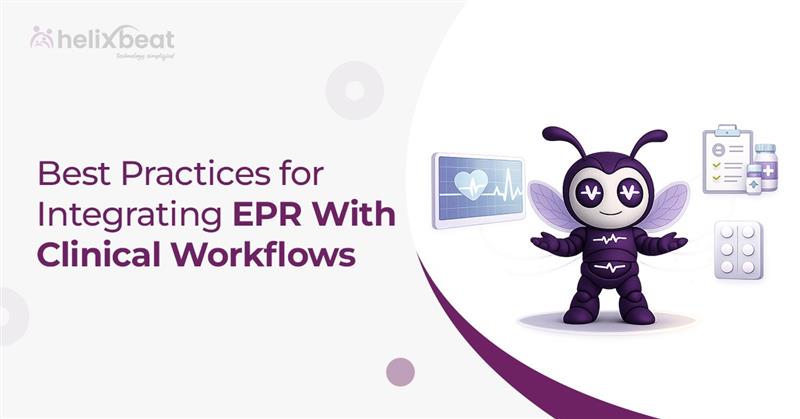Today, healthcare data management plays a key role in shaping the future of medicine. Imagine having a patient’s complete medical history available instantly, helping doctors make quick decisions that save lives. This is healthcare data management – organizing, storing, and using health information through systems like EHRs, big data analytics, and cloud platforms. With the rise of data from wearables, telemedicine, and genomics, effectively managing healthcare data is important for transforming raw data into valuable insights.
In this blog, we’ll explore 10 key benefits and challenges of healthcare data management, showing how it’s changing the industry and the pitfalls to watch out for.

Table of Contents
Benefits of Healthcare Data Management
Healthcare data management is more than just storing files—it’s about using data to improve lives. Here are five key benefits that highlight its impact.
1. Enhanced Patient Outcomes with Real-Time Insights
With real-time insights, healthcare data management directly improves patient outcomes. For example, in a busy emergency room, doctors can instantly access vital information like allergy history, medication records, and lab results through integrated EHR systems. This smooth data flow helps prevent errors, such as prescribing conflicting drugs, which can lead to avoidable deaths.
In practice, hospitals that use advanced healthcare data management tools have reported reductions in readmission rates of up to 20%. For example, with predictive analytics, doctors can identify patients at high risk for heart failure and intervene before a crisis occurs. As data from wearables like fitness trackers flows into these systems, doctors can also create personalized care plans. The result? A shift from reactive to preventive medicine, where healthcare data management acts as a silent guardian.
2. Cost Savings and Operational Efficiency
Healthcare data management shines brightly when it comes to slashing costs and streamlining operations. It reduces paper trails, helping providers cut storage costs and minimize the risk of losing documents. Similarly, analytics platforms within these systems identify inefficiencies, such as ordering excessive tests or keeping patients in the hospital longer than necessary. By spotting these issues, providers can cut their operational costs by as much as 15-25%.
For example, hospitals can predict medication and equipment demand by analyzing usage patterns and prevent waste. Accurate billing data reduces claim denials and speeds up reimbursements. As a result, these efficiencies allow more resources for patient care.
3. Advancing Medical Research and Innovation
The role of healthcare data management in propelling medical research forward cannot be overstated. By aggregating anonymized data from millions of patients, researchers gain unprecedented access to datasets that fuel discoveries in areas like oncology and epidemiology.
Big data analytics, a core component of healthcare data management, enables machine learning models to predict disease outbreaks or test drug efficacy virtually. Collaborations between institutions, facilitated by secure data-sharing protocols, have led to breakthroughs in personalized medicine, such as targeted therapies for rare genetic disorders. Moreover, this management promotes innovation in AI-driven diagnostics, where algorithms trained on vast datasets occasionally outperform human accuracy in detecting rare conditions.
As a result, healthcare data management bridges the gap between clinical practice and cutting-edge science.
4. Improved Regulatory Compliance and Risk Management
With solid healthcare data management, dealing with complex healthcare regulations is no longer a headache. Standards like HIPAA in the US mandate strict data handling, and digital systems automate compliance by tracking access logs and encrypting sensitive information. This proactive approach minimizes the risk of hefty fines.
Beyond compliance, these systems enhance risk management by flagging potential issues early. For example, audit trails reveal unauthorized access attempts, while automated alerts notify teams of non-compliant practices. With data breaches making headlines, proper healthcare data management protects patient privacy and keeps the institution’s reputation intact.
5. Enabling Personalized and Preventive Care
At its heart, healthcare data management empowers personalized and preventive care. By integrating genomic data with lifestyle metrics, healthcare providers can create personalized treatment plans that take into account both genetic predispositions and environmental factors.
This shift to prevention reduces the burden on healthcare systems by catching issues early – for example, AI algorithms can analyze trends to predict asthma attacks based on air quality data. Thus, healthcare data management humanizes medicine, making it more intuitive and patient-centric.
Challenges of Healthcare Data Management
While the benefits are great, managing healthcare data isn’t easy. Here are some challenges that keep industry leaders on their toes.
1. Data Privacy and Security Risks
Despite using encryption and firewalls, vulnerabilities still exist, especially in older systems. Ransomware attacks, which have shut down hospitals, show how critical this issue is—operations come to a halt, putting lives at risk. Maintaining security while keeping data accessible requires constant attention, as human errors like phishing are often the weakest point. As regulations change, healthcare organizations must stay ahead of cybercriminals, making data security an ongoing challenge.
2. Interoperability and Data Silos
A big problem in healthcare is that different systems don’t talk to each other. Many clinics and hospitals use their own software, which creates “data silos.” Rural clinics especially struggle with outdated technology, which makes the problem even worse. It will take considerable effort from both software companies and policymakers to resolve this issue, but for now, resistance to change is hindering progress.
3. Maintaining Data Quality and Accuracy
High-quality data forms the foundation of effective healthcare data management, but achieving it is no small feat. Inaccuracies creep in from manual entries, inconsistent formats, or incomplete records. For example, a misentered blood type could spell disaster in transfusions. Therefore, cleaning and validating data takes a lot of effort, and that’s where AERIS can help solve these challenges.
Unlock Seamless Healthcare Data Management with AERIS
Managing healthcare data can be complex, but AERIS from Helixbeat simplifies it. By addressing key challenges, AERIS revolutionizes how healthcare organizations manage data privacy, interoperability, and quality.
- Boosting Data Privacy and Security: AERIS uses AES and TLS encryption to protect sensitive patient data from cyber threats like ransomware. With role-based access and audit trails, it limits exposure and helps prevent mistakes like phishing, keeping patient trust intact while maintaining easy access to data.
- Breaking Down Data Silos: AERIS improves interoperability by converting data into FHIR standards, facilitating different systems like EHRs and lab tools to communicate seamlessly. Whether it’s integrating older systems in rural clinics or modern platforms, AERIS bridges the gap, reducing unnecessary tests and improving care coordination.
- Improving Data Quality and Accuracy: AERIS automatically cleans and validates data to catch errors, such as misentered blood types, before they cause harm. Besides, real-time analytics streamlines workflows, increasing both efficiency and patient safety.
Final Thoughts
Healthcare data management is a powerful tool for progress, but it comes with its challenges. While it improves patient care and drives research, issues like privacy threats and high costs remain. However, by investing in solutions like AERIS, we can shape a healthier future.
Explore how AERIS can help you tackle data management challenges. Transform your healthcare data today!
FAQs
1. Why is healthcare data management important?
Proper healthcare data management allows healthcare organizations to access patient information quickly, improve care coordination, reduce errors, and comply with regulatory standards.
2. What are the challenges in healthcare data management?
Some common challenges in healthcare data management include data privacy and security risks, interoperability between different systems, and maintaining the quality and accuracy of patient data.
3. What is the role of data analytics in healthcare data management?
Data analytics in healthcare data management helps identify trends, optimize treatment plans, and improve patient outcomes by extracting valuable insights from large sets of healthcare data.
4. How can healthcare data management improve patient care?
By improving access to accurate, real-time data, healthcare data management allows providers to make more informed decisions, streamline treatment plans, and improve overall patient outcomes.













